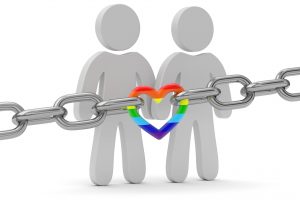 There’s no doubt that we live in literally the best age for dating ever. Just a few hundred years ago, your spouse was more or less whoever your parents chose for you, and if you were born in a family of even remotely noble standing (as in, anyone who doesn’t work in the fields all day), then you can just forget ever being romantically happy, especially if you were gay. Today, however, in most of the world you can date whoever you want! Boys, girls, neither, the only thing restricting your romantic partners are your own sexuality and preferences. Hundreds, if not thousands of potential dates are literally only a click away. Keep swiping left until you find the person of your dreams, and then hope they swipe right on you! And who knows, maybe sooner or later you’ll find the one you’re destined to spend the rest of your life with, even if it’s on a site for casual hook-ups like Grindr.
There’s no doubt that we live in literally the best age for dating ever. Just a few hundred years ago, your spouse was more or less whoever your parents chose for you, and if you were born in a family of even remotely noble standing (as in, anyone who doesn’t work in the fields all day), then you can just forget ever being romantically happy, especially if you were gay. Today, however, in most of the world you can date whoever you want! Boys, girls, neither, the only thing restricting your romantic partners are your own sexuality and preferences. Hundreds, if not thousands of potential dates are literally only a click away. Keep swiping left until you find the person of your dreams, and then hope they swipe right on you! And who knows, maybe sooner or later you’ll find the one you’re destined to spend the rest of your life with, even if it’s on a site for casual hook-ups like Grindr.
Unfortunately, online dating comes with its own set of risks, and its own measures that need to be taken to ensure safety. While these risks aren’t exclusive to the LGBT community, a lot of them are increased if you don’t exactly identify as straight or cis. And while hopefully you’ll never, ever need to actually rely on these security measures, having them in place “just in case” is always a great idea. Regardless of who you are, regardless of who you’re dating, there’s ALWAYS risk involved, so why take it when you can minimize it? Let’s take a closer look at some preparations you can make to ensure your date has a happy ending no matter what!
First and foremost, before you’ve even met your date, it’s really important to be honest, for both of you. Absolutely run the pictures that the person has on their profile through Google’s reverse image search – if any of them come back, it’s likely that the person isn’t who they claim they are. If there’s any doubt at all, feel free to request a picture that can’t possibly be found online (for example, of them touching the tip of their nose). Everyone’s got a camera on their phone these days, and if they claim they can’t take the picture for whatever reason, don’t meet them! If the pictures on the profile check out, and there’s no reason to be concerned, at the very least ask them for their real name and try looking them up, see if you’ll find something that might raise a red flag.
 Of course, that honesty extends to you as well. By all means make sure to provide your own name and pictures. After all, your potential date is likely having the very same concerns you are! In addition, it’s important to let them know if you’re trans. This information doesn’t have to be on your public profile, obviously, but if you’re seriously considering meeting a person in real life for a date, then the fact that you’re not cis is something they should absolutely be aware of. Not all men are attracted to trans women, and similarly, a lot of straight women aren’t into trans guys. That’s not transphobic, it’s just a sexual preference that we have no control over. And if you claim or imply to be a cis woman while you’re trans, chances are that the date isn’t really going to go well once you do meet – hell, a lot of people who would’ve been fine with dating a trans person if warned beforehand might feel deceived or lied to when they figure it out on the spot. And worst of all, you might end up in physical danger, if you happen upon a disgruntled guy who actually IS transphobic. So be honest and tell your potential partner everything they should know before meeting them, while expecting the same treatment.
Of course, that honesty extends to you as well. By all means make sure to provide your own name and pictures. After all, your potential date is likely having the very same concerns you are! In addition, it’s important to let them know if you’re trans. This information doesn’t have to be on your public profile, obviously, but if you’re seriously considering meeting a person in real life for a date, then the fact that you’re not cis is something they should absolutely be aware of. Not all men are attracted to trans women, and similarly, a lot of straight women aren’t into trans guys. That’s not transphobic, it’s just a sexual preference that we have no control over. And if you claim or imply to be a cis woman while you’re trans, chances are that the date isn’t really going to go well once you do meet – hell, a lot of people who would’ve been fine with dating a trans person if warned beforehand might feel deceived or lied to when they figure it out on the spot. And worst of all, you might end up in physical danger, if you happen upon a disgruntled guy who actually IS transphobic. So be honest and tell your potential partner everything they should know before meeting them, while expecting the same treatment.
Of course, that may not necessarily be enough. sometime you might find yourself in actual, physical danger regardless of the circumstances – some people of both genders believe that they’re entitled to either your money or your body, regardless of what was agreed upon beforehand, and they won’t take no for an answer. So make sure that you’ve got a friend on stand-by who you can call to bail you out of the situation as soon as possible. In addition, there are apps and services that track your phone’s GPS, so in case you end up drunk, drugged or worse, you can send a text to a friend with access to your phone’s location and request a pick-up, even if you’ve got no clue where you are. Again, these are just extreme case scenarios, but it’s better to have the necessary security measures in place and not need them than to absolutely need them and not have them. They could potentially save you from something really terrible.
 Most of us LGBT folk have been there at one point or another. We’ve just discovered that we’re not like other people, sexually speaking. We like the same gender, or we feel like we are the opposite gender or no gender at all, or sometimes we just can’t even properly explain it or classify it, but we know for a fact that words like “cis” or “straight” don’t define us. But what do we do now? Friends can’t know about this, they’ll make fun of us! The family must DEFINITELY not be told, because what are they even gonna think?! We want to explore this side of ourselves, we want to know more about it, but the world all of a sudden becomes a terrifying, overwhelming place. You hear your grandma talk about gay people as if they’re vermin, you hear your friends at school make transphobic jokes, you hear strangers on the bus whispering, and all the while all you want to do is disappear.
Most of us LGBT folk have been there at one point or another. We’ve just discovered that we’re not like other people, sexually speaking. We like the same gender, or we feel like we are the opposite gender or no gender at all, or sometimes we just can’t even properly explain it or classify it, but we know for a fact that words like “cis” or “straight” don’t define us. But what do we do now? Friends can’t know about this, they’ll make fun of us! The family must DEFINITELY not be told, because what are they even gonna think?! We want to explore this side of ourselves, we want to know more about it, but the world all of a sudden becomes a terrifying, overwhelming place. You hear your grandma talk about gay people as if they’re vermin, you hear your friends at school make transphobic jokes, you hear strangers on the bus whispering, and all the while all you want to do is disappear.
Unfortunately, as welcoming and friendly as the LGBT community is, sometimes, for whatever reason, people – especially those who are still coming to terms with their sexuality and discovering their new identity – don’t feel like embracing it and becoming part of it just yet. Or even when they do, sometimes there’s questions that one may not feel entirely comfortable asking. That’s why we’re here. This blog is dedicated to offering tips and advice to LGBT folk everywhere in order to ensure that they remain safe in a world that, while admittedly growing less hostile towards them every year, can still remain a frighteningly toxic place. We’ll NEVER ask you for a registration or identification, and we’ll never record your IP or any sort of personal data. We only ask one thing – that you remain safe. Hopefully the articles on this blog will help answer some questions and concerns that you never felt comfortable asking others.